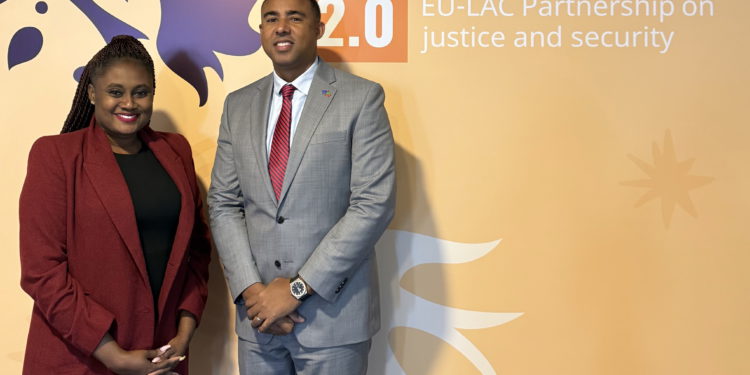BASSETERRE, SAINT KITTS AND NEVIS, JUNE 23, 2025 – The Ministry of Justice and Legal Affairs has successfully secured over EC$1 million in international funding and technical support to accelerate wide-ranging reforms within the Federation’s justice system.
This milestone achievement, spearheaded by the Honourable Attorney General and Minister of Justice and Legal Affairs, Senator Garth Wilkin, and Permanent Secretary, Nerissa Williams, marks a strategic shift toward data-driven, rights-based, and regionally integrated approaches to justice.
The Ministry’s 2025 reform programme is being delivered through robust partnerships with international and regional institutions, including the United Nations Development Programme (UNDP), United Nations Office on Drugs and Crime (UNODC), European Union-funded EL PAcCTO, UN Women, and the Office of the United Nations High Commissioner for Human Rights (OHCHR).
“We are building a justice system that is modern, human-centered, and regionally respected. These investments reflect the trust and confidence our international partners place in our reform vision and Sustainable Island State Agenda. Together with our international partners, we intend to deliver real change: fewer delays, fairer outcomes, and better protection for the vulnerable.” said Attorney General Wilkin.
Key Achievements to Date:
- Restorative Justice and Diversion Programmes
Two flagship initiatives—the Community-Based Restorative Justice Pilot and the National Diversionary Caution System—are being rolled out with combined financial and technical support exceeding EC$750,000. These reforms provide alternatives to incarceration and strengthen rehabilitation through mediation, police-community training, and legal frameworks such as the forthcoming Diversion Bill.
- Digital Access and Legal Literacy
Through the UNDP PACE Justice Project, two “VoiceIt” legal access kiosks will be installed by September 2025. These voice-activated, multilingual kiosks will empower citizens to navigate national laws and legal rights independently, powered by assistive technology for persons with disabilities and representing a major leap forward in digital inclusion.
- Institutional Performance and Human Rights Training
The Ministry has launched a Planning, Monitoring & Evaluation (PM&E) programme targeting justice leadership—from the Director of Public Prosecutions to the Registrar of the High Court. In the second half of 2025, OHCHR will also conduct a human rights training programme for Crown Counsels and Prison Officers, embedding global human rights norms into local practice.
- Gender-Responsive Justice and Legal Reform
Collaborations with UN Women are underway to implement gender-sensitive judicial reasoning and policy tools. These efforts will align national justice delivery with international gender equality frameworks such as CEDAW and the Beijing Platform for Action.
- Justice System Modernisation and Legal Aid Enhancement
Through ongoing partnerships with EL PAcCTO 2.0 and UNODC, the Ministry is actively improving investigative standards, legislative review capacity, cybercrime enforcement, and the quality of legal aid services.
“Our reforms are designed to deliver on Sustainable Development Goal 16—Peace, Justice, and Strong Institutions,” added Permanent Secretary Williams. “We are expanding access to justice through digital innovation and community-based alternatives, strengthening legal protections and professional standards, embedding human rights into policing and detention practices, and ultimately enhancing public trust in the justice system.”
Looking ahead, the Ministry is finalising a Justice Sector Innovation Roadmap that will consolidate these initiatives and set out a five-year vision for legal harmonisation, technological transformation, and regional cooperation.









